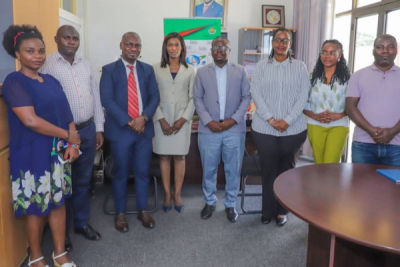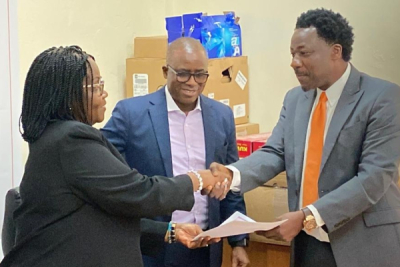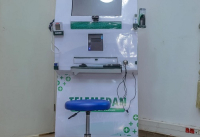As Africa undergoes a digital transformation, the continent is strategically positioning itself to leverage the opportunities of artificial intelligence. To this end, Morocco, Kenya, and Nigeria have partnered to launch an initiative promoting AI for the public good.
Smart Africa, an alliance of 40 African countries overseeing the continent's digital agenda, said on Wednesday it will officially launch the African Artificial Intelligence Council (AI Council) in April 2025. The announcement comes ahead of the Global AI Summit on Africa, slated for April 3-4 in Kigali, where council members will be appointed. The exact number of members has not yet been disclosed.
The AI Council will bring together policymakers, business leaders, and key players in the AI ecosystem. Its mission is to drive digital transformation, foster innovation, and develop policies aimed at accelerating Africa’s digital economy.
According to Smart Africa, the council will promote collaboration, knowledge-sharing, and innovation to position Africa as a strategic player in the global AI landscape. It will also work to ensure that AI technologies are leveraged in a way that benefits all sectors of society and supports inclusive growth.
The initiative was first announced during the High-Level Meeting on Artificial Intelligence for Africa, held in Rabat, Morocco, on February 4, 2025. Ahead of its official launch, stakeholders also met on the sidelines of the AI Action Summit in Paris from February 10-11. Further consultations are planned during the Mobile World Congress in Barcelona from March 3-6.
This initiative comes as African nations seek to capitalize on AI, a technology that could add $2.9 trillion to the continent’s economy by 2030—equivalent to a 3% increase in annual GDP, according to the GSMA. The organization highlights AI’s potential to support the Sustainable Development Goals by providing innovative solutions for more inclusive and sustainable development, particularly in critical areas.
However, GSMA also points to several challenges that must be addressed for Africa to fully harness AI’s potential. These include low mobile internet adoption, a persistent digital divide, insufficient digital skills, a lack of regulatory frameworks, limited research capacity, weak energy infrastructure, and ethical and security risks. Additionally, there is a shortage of AI solutions tailored to the continent’s specific challenges.
By Isaac K. Kassouwi,
Editing by Sèna D. B. de Sodji
AI models are primarily trained on online data, which tends to favor widely spoken languages like English. As a result, African languages are often underrepresented in AI-based solutions. This gap has prompted African tech entrepreneurs to take action and develop initiatives to integrate local languages into artificial intelligence systems.
ToumAI is a Moroccan startup specializing in customer experience (CX) optimization through AI-driven voice analytics. The company addresses gaps in current AI systems by integrating African languages and dialects, which are often overlooked in traditional language models.
"Our HolistiCX suite is pioneering a new era in customer experience, where businesses can adapt interactions to generational preferences, emotional profiles, communication channels, and cultural nuances—all while using hashtag#AI systems that are more sustainable and efficient," the company explains.
Founded in 2020 by Youcef Rahmani, Odin Demassieux, and Imade Benelallam, ToumAI works closely with telecom operators, banks, and call centers to collect and analyze voice data. This approach allows its AI to accurately process local dialects, accents, and speech patterns, making it a game-changer for emerging markets.
"In a world where AI advancement has been dominated by the US, China, and to a lesser extent Europe, we are proud to be building an important AI application layer from Africa for global markets," says co-founder Youcef Rahmani.
ToumAI has caught the attention of major tech players, earning recognition from Intel Liftoff for Startups and Nvidia Inception, accelerator programs run by U.S. semiconductor giants Intel and Nvidia.
On Monday, February 10, the startup announced it had successfully raised $1 million in funding. The investment will fuel technology development, team expansion, and market growth, solidifying ToumAI’s position as a key innovator in AI-driven customer experience for Africa and beyond.
By Adoni Conrad Quenum,
Editing by Feriol Bewa
Like many African countries, Burundi has made digital transformation a key driver of its economic and social development. However, the country struggles to finance its various projects.
Burundi is exploring partnerships with the International Finance Corporation (IFC) for digital projects. An IFC delegation met with the Burundian Executive Secretariat for Information and Communication Technologies (SETIC) on Monday to discuss the matter.
The initiative aligns with Burundi’s vision of becoming an emerging country by 2040 and a developed nation by 2060, with digital technology as a key development driver. The government aims for a "technological leap" to boost economic growth by fostering business activities within a secure legal framework leveraging ICT.
In January, the Senate unanimously ratified the East African Community (EAC) protocol on ICT networks, facilitating stronger cooperation with neighboring countries to accelerate digital sector development. In November 2024, Burundi signed a memorandum of understanding with Vietnam to deepen collaboration in this area. The World Bank launched the $92 million Digital Economy Foundations Project (PAFEN) in September 2024 to support Burundi’s digital infrastructure.
Despite these efforts, Burundi ranks 46th out of 47 African countries in the International Telecommunication Union’s (ITU) 2024 ICT Development Index, with a score of 24.4 out of 100. The country’s internet penetration rate is 19%, mobile broadband coverage is 8.3%, and mobile phone usage is 25.6%. Only 50.6% of the population has at least 3G coverage, and 32.2% has 4G. The UN Department of Economic and Social Affairs (UN DESA) classifies Burundi as having a low e-Government Development Index (EGDI) of 0.2480 out of 1, significantly below the global average of 0.6382.
Details of the SETIC-IFC discussions remain unclear. No official agreement has been signed or announced, leaving the scope and implications of the potential collaboration uncertain.
By Isaac K. Kassouwi,
Editing by Sèna D. B. de Sodji
In a global context where digital technology is becoming a key driver of economic and social development, the Liberian government is investing to ensure high-quality Internet access for all, including more affordable costs.
The Liberia Telecommunications Authority (LTA) is modernizing the Liberia Internet Exchange Point (LIXP), the country’s sole internet exchange point. Last week, the regulator acquired $39,000 worth of new equipment for the LIXP, which it said will improve internet quality.
“The main goal of an IXP is to improve the efficiency of Internet routing by allowing for direct interconnection between networks. This can help reduce latency, decrease bandwidth costs, improve network performance, and enhance overall Internet reliability and resilience" the LTA said in a Facebook statement.
Improved internet connectivity could support the government’s “Digital Fast Track” program, which aims to accelerate Liberia’s digital transformation by improving digital infrastructure and services. The government considers digital infrastructure crucial for achieving national development goals.
The UN Department of Economic and Social Affairs (UN DESA) ranks Liberia 47th out of 54 African countries in e-government deployment, with an e-Government Development Index (EGDI) score of 0.2513 out of 1. UN DESA notes that Liberia has an average EGDI, “reflecting steady growth in digital integration despite various challenges.” The International Telecommunication Union (ITU) ranks Liberia 36th out of 47 African countries for ICT development, with a score of 37.1 out of 100.
Despite government efforts, Liberia faces significant digital infrastructure deficits beyond the internet exchange point. The country has only one fiber-optic submarine cable, which is frequently disrupted and affects internet access. According to Datacenterplatform, Liberia has only one data center. UN DESA gives Liberia a telecom infrastructure score of 0.1238 out of 1, a key component of the EGDI.
By Isaac K. Kassouwi,
Editing by Sèna D. B. de Sodji
Mobile video games are experiencing rapid growth in Africa, driven by a tech-savvy youth and widespread access to digital technologies. This dynamic sector presents a significant opportunity for innovation, entrepreneurship, and economic development across the continent.
Sonatel, a subsidiary of French telecom group Orange, and Netgem, a digital entertainment solutions provider, announced on Wednesday the launch of Wido Games, West Africa's first cloud gaming platform. The service will be available to Sonatel subscribers later this month.
"With this partnership, we are proud to launch the first Cloud Gaming service in West Africa with a simple promise: a console gaming experience on any device, powered by the strength of our network," said Malick Dary, Sonatel’s Director of Consumer Marketing.
The launch comes amid rapid expansion of digital infrastructure in West Africa, including investment in high-speed technologies, and a booming video game industry. Sonatel, which has invested nearly 263 billion CFA francs ($416 million) in network expansion, continues to seek new ways to meet the growing demand for digital entertainment.
Wido Games represents a major step forward for cloud gaming in Africa, a continent experiencing remarkable growth in mobile gaming. A February 5 study by African game publisher Carry1st and market research firm Newzoo showed Africa’s mobile gaming market reached $1.8 billion in 2024, a 12.4% increase from 2023. This growth rate significantly outpaces the global industry’s 2.1% growth in 2024.
Wido Games will allow players to enjoy console-quality gaming on their smartphones, with PC compatibility planned soon, without the need for expensive gaming equipment. Sonatel’s high-speed network, including 5G coverage, is expected to provide a smooth, lag-free experience.
By Samira Njoya,
Editing by Sèna D. B. de Sodji
The rapid expansion of digital services across Africa has led to a surge in online attacks, jeopardizing the security of individuals and businesses. Addressing these growing cyber threats requires immediate action.
Burkina Faso launched a new online platform, “Alerte-BCLCC,” on Tuesday to allow citizens to report cybercrimes and flag online content promoting terrorism. The platform, accessible at alerte.bclcc.gov.bf and available for download on Play Store (Android) and AppGallery (Huawei), was launched by the Ministry of Security through its Central Brigade for Combating Cybercrime (BCLCC).
"With this tool, our specialized forces will be able to intervene more quickly, analyze trends more effectively, and strengthen actions to combat these new forms of cybercrime," said Mahamadou Sana, Minister of Security, urging Burkinabè citizens to use the platform.
The initiative is part of the government’s efforts to strengthen national cybersecurity amid rapid digital transformation, including increased use of electronic communication services and a rise in cyberattacks. According to national authorities, cybercriminals extorted more than 3 billion CFA francs (approximately $5 million) from Burkinabè citizens between 2020 and 2023.
Last November, Burkina Faso approved a National Cybercrime Strategy (2025-2029) to modernize its tools for combating digital threats.
The “Alerte-BCLCC” platform ensures user data confidentiality, allowing for anonymous and secure incident reporting. Users can transmit essential information to the BCLCC with a few clicks, enabling rapid and targeted interventions. The system reflects Burkina Faso’s commitment to protecting its citizens in cyberspace and adapting to evolving security challenges.
By Samira Njoya,
Editing by Sèna D. B. de Sodji
Digital banking platform Affinity Africa announced on February 11 that it had raised $8 million in an oversubscribed Seed Round led by Grazia Equity and BACKED VC to expand financial services for the unbanked.
Affinity operates a branchless model via a mobile app, agent network, and proprietary tech. Unlike traditional banks, it charges no monthly fees or transaction costs.
With this capital, Affinity will scale operations in Ghana and expand further across Africa, driving financial inclusion.
In Africa, digital identification is crucial for socioeconomic development. Many countries face challenges with financial inclusion and public service management, and are reforming their systems to provide citizens with secure, interoperable digital IDs.
The Democratic Republic of Congo (DRC) is moving forward with plans for a national digital identification system. DRC Minister of Posts, Telecommunications, and Digital Affairs Augustin Kibassa Maliba met on Monday in Singapore with Soon Huat Lim, CEO of Trident Digital Tech Holdings Ltd., a Singaporean digital transformation company, to discuss the technical and operational aspects of deploying the system. The meeting is a key step before the anticipated signing of a collaboration agreement that will launch the project.
"We recognize that digital or electronic identification is one of the pillars of e-government," said Kibassa Maliba. "I took note of the CEO’s remarks about forming a commission to oversee the work since digital operations fall under the ministry’s responsibility. However, when it comes to identity, it is essential to involve other institutions so we can ensure a unified government vision for the development of the digital sector."
The initiative is part of the DRC's National Digital Plan Horizon 2025, reflecting President Félix Tshisekedi’s goal of making the DRC a leading digital player in Africa. The plan envisions digital technology as a driver of integration, good governance, economic growth, and social progress.
The Monday meeting follows a preliminary agreement signed in December between the DRC and Trident Digital Tech Holdings Ltd. That agreement established the groundwork for a partnership to develop and implement a platform for managing digital identities and citizen data.
Once operational, the DRC's system will join other African nations that have adopted or are developing digital identification frameworks, including Nigeria’s National Identity Management System (NIMS), Ghana’s National Identification Authority (NIA), and Rwanda’s e-ID system. These initiatives aim to improve public service efficiency, strengthen data security, enhance access to financial services, and promote digital and economic inclusion.
By Samira Njoya,
Editing by Sèna D. B. de Sodji
To provide healthcare access to populations in remote areas of Africa, Abakar Mahamat has launched an e-health solution supported by various institutions, including Chad’s Ministry of Health and the World Bank.
Telemedan is an e-health solution developed by a Chadian startup. It aims to improve access to healthcare in the country’s remote and underserved regions. Founded in 2021 by Abakar Mahamat, the N’Djamena-based company has gained support from several institutions, including the Ministry of Health, the United Nations Development Programme (UNDP), and the World Bank.
The healthtech company deploys solar-powered telemedicine kiosks equipped with diagnostic tools such as electrocardiograms (ECG), stethoscopes, oximeters, and ultrasound probes. These allow patients in rural areas to benefit from remote consultations with healthcare professionals in better-equipped regions.
“Our goal is to make healthcare affordable, accessible, and scalable, ensuring that no one is left behind, especially in areas with limited infrastructure,” Abakar Mahamat told Disrupt Africa.
To access care, patients use the solution’s mobile app, available on iOS and Android. The startup has also introduced a USSD code for people without internet access. Notably, Chad’s internet penetration rate stood at 22.5% in January 2024, according to DataReportal.
Since its launch, Telemedan has served more than 2,000 users and conducted nearly 10,000 consultations. The company plans to expand its operations to other sub-Saharan African countries, aiming to deploy 100 kiosks and reach 1 million people over the next three years, according to Abakar Mahamat.
By Adoni Conrad Quenum,
Editing by Feriol Bewa
Fixed-satellite operator and service provider Spacecom announced on February 5 that it has signed a $3.8 million agreement with an undisclosed African government to deliver satellite communication services via the AMOS-17 satellite for a 12-month period.
This deal marks a major expansion of Spacecom’s operations in Africa, reinforcing its international presence in the satellite services sector.
With Africa's growing demand for reliable connectivity, Spacecom's expansion aligns with the continent's push for enhanced digital infrastructure, particularly in government, security, and public services.
More...
The rise of social media and the internet has intensified the spread of harmful and misleading content. This surge in disinformation poses a threat to social stability, especially in Africa, where it can create confusion and exacerbate tensions.
Francophone Africa now has a dedicated mobile application to combat disinformation. Launched on Thursday, February 6, by Tama Média, La Voix de Mopti, and Sétanal Média, with support from Organisation Internationale de la Francophonie (OIF), the AKILI app aims to bolster fact-checking in a region increasingly saturated with misleading content.
“AKILI relies on a unique combination of cutting-edge technology, artificial intelligence, and human intervention to provide a solution tailored to the region's complex challenges,” the project’s initiators explained. “By leveraging advanced algorithms, AKILI analyzes and verifies information from reliable sources while allowing users to seek expert input from specialized journalists for more complex cases. This hybrid approach ensures a high level of accuracy and credibility.”
The launch is part of the Jumelages entre initiatives francophones de lutte contre les désordres de l'information" (Collaborations between Francophone initiatives combating information disorders) program, which selected the three media partners as 2024 laureates. Designed with an intuitive and engaging interface, the app is accessible to all. It also promotes digital literacy by educating users on the mechanics of disinformation and fostering critical thinking—an essential skill given the growing spread of false information.
AKILI offers several key features: users can verify the authenticity of an article by pasting its link into the chatbot; query the AKILI chatbot via text, video, or voice note; submit fact-checking requests to specialized journalists when a claim cannot be automatically verified; and access educational content, including podcasts and fact-checking videos. These resources are available in French and African languages such as Fulfuldé, Bambara, Wolof, Lingala, and Swahili.
In an African context where disinformation can have significant consequences for social stability and community cohesion, AKILI positions itself as an essential tool. By improving access to reliable information, the app aims to strengthen public trust in the media and contribute to both social stability and sustainable development across African societies.
By Samira Njoya,
Editing by Sèna D. B. de Sodji
Nigeria is leveraging digital technology to enhance public services. To achieve this, the government is actively pursuing international partnerships.
Nigeria is exploring a partnership with Ukraine to digitize its public services. The topic was discussed during a meeting last week between Kashifu Inuwa Abdullahi (photo, center), Director General of the National Information Technology Development Agency (NITDA), and Ivan Kholostenko, Ukraine’s ambassador to Nigeria.
"The discussions centered on exchanging knowledge and exploring advanced digital solutions by leveraging technology to streamline public services, enhance transparency, and improve governance efficiency," NITDA stated in a social media release.
This initiative is part of Nigeria’s digital transformation strategy, which aims to digitize 75% of public services by 2027. As of now, the One Gov platform (Services - 1gov.ng) provides access to 271 digital public services, according to the GSMA. Meanwhile, the Data.gov.ng portal makes non-sensitive government datasets publicly available, promoting transparency and inclusion. The government is also rolling out an Electronic Document Management System (EDMS) to digitize all administrative records.
Currently, Nigeria ranks 144th out of 193 countries in the United Nations E-Government Development Index, with a score of 0.4815 out of 1. While this places the country above the averages for West Africa and Africa, it remains below the global average. In the Online Services sub-index, Nigeria scores 0.5372 out of 1.
In contrast, Ukraine ranks 30th globally in e-government development, with a score of 0.8841, surpassing the averages for the world, Eastern Europe (0.8127), and Europe as a whole (0.8493). The country relies heavily on its Diia app, which the Ukrainian delegation presented to NITDA. This digital platform centralizes government services, databases, and state registries within a unified ecosystem.
While Ukraine has the expertise to support Nigeria, the partnership remains at the discussion stage, with no agreement signed or announced. Additionally, digital service adoption in Nigeria faces obstacles, including limited Internet access. According to the GSMA, 120 million Nigerians still lack access to mobile Internet.
Isaac K. Kassouwi
Digital transformation has emerged as a key driver of economic and social development worldwide. In West Africa, it is now a crucial tool for strengthening governance, improving public services, and promoting digital inclusion.
The Economic Community of West African States (ECOWAS) plans to make digital transformation as a key driver of inclusive and sustainable development across its member states. To accelerate its efforts in that direction, the institution is betting on the World Bank-backed West Africa Regional Digital Integration Project (WARDIP).
This commitment was underscored at the ECOWAS Experts Forum on E-Government, held in The Gambia on February 6-7. The forum convened experts from member states and United Nations representatives to discuss the progress and future of e-government in the region.
Discussions focused on analyzing findings from the UN's 2024 E-Government Survey and enhancing data governance expertise. Participants explored critical areas including digital identity, system interoperability, data management, and developing citizen-centric digital content.
This initiative is in line with ECOWAS Vision 2050 and the 2023-2027 Community Strategic Framework, both of which champion inclusive and sustainable development. The ECOWAS Commission aims to establish information and communication technologies (ICTs) as vital engines for economic growth and social inclusion. The ultimate goal is a unified West African digital market, promoting shared prosperity and boosting key sectors like e-commerce, e-health, smart agriculture, and online education.
However, significant challenges remain. ECOWAS nations must address coordination gaps between government institutions, inadequate digital infrastructure, a shortage of specialized digital skills, and growing data protection and cybersecurity concerns. To overcome these hurdles, the Commission is urging greater engagement from digital ecosystem stakeholders, stronger regional cooperation, and increased investment to ensure a successful and sustainable digital transition across the region.
Samira Njoya
Digital transformation is a crucial step in improving government efficiency, reducing bureaucracy, and fostering economic growth. Digitalization of public services is essential for enhancing transparency, reducing processing times, and improving accessibility for citizens and businesses.
On February 7, President Wavel Ramkalawan of Seychelles visited the Registrar General’s Office. The visit reaffirmed his administration’s commitment to digitalizing public services.
During the visit, he toured key departments, including Business Registration and Intellectual Property, which play vital roles in business development and innovation protection. He also engaged with senior management to discuss institutional achievements, ongoing challenges, and modernization efforts aimed at improving service efficiency.
Addressing the media alongside Registrar General Wendy Pierre, President Ramkalawan praised the office’s progress in digitalization, emphasizing its role in enhancing service accessibility. He also announced upcoming legislative reforms to support the transition to modernized operations.
The Registrar General’s Office remains focused on creating a transparent, efficient, and technology-driven framework to support Seychelles' development, with digital services set to improve accessibility and efficiency for all citizens.
Globally, digital transformation in government has proven to increase efficiency and reduce corruption. The 2024 UN E-Government Development Index (EGDI), which evaluates e-government readiness and e-participation across UN Member States, ranks Seychelles 92nd out of 193 countries with a score of 0.6773 (out of 1). This reflects its progress in adopting digital services. However, further modernization efforts are necessary to maintain this lead.
Hikmatu Bilali















